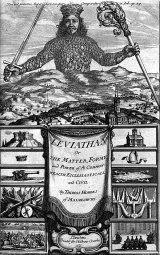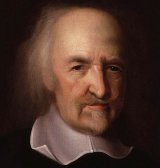Leviathan Page #8
Leviathan or The Matter, Forme and Power of a Common-Wealth Ecclesiasticall and Civil—commonly referred to as Leviathan—is a book written by Thomas Hobbes (1588–1679) and published in 1651 (revised Latin edition 1668). Its name derives from the biblical Leviathan. The work concerns the structure of society and legitimate government, and is regarded as one of the earliest and most influential examples of social contract theory.
CHAPTER V. OF REASON, AND SCIENCE. Reason What It Is When a man Reasoneth, hee does nothing els but conceive a summe totall, from Addition of parcels; or conceive a Remainder, from Substraction of one summe from another: which (if it be done by Words,) is conceiving of the consequence of the names of all the parts, to the name of the whole; or from the names of the whole and one part, to the name of the other part. And though in some things, (as in numbers,) besides Adding and Substracting, men name other operations, as Multiplying and Dividing; yet they are the same; for Multiplication, is but Addition together of things equall; and Division, but Substracting of one thing, as often as we can. These operations are not incident to Numbers onely, but to all manner of things that can be added together, and taken one out of another. For as Arithmeticians teach to adde and substract in Numbers; so the Geometricians teach the same in Lines, Figures (solid and superficiall,) Angles, Proportions, Times, degrees of Swiftnesse, Force, Power, and the like; The Logicians teach the same in Consequences Of Words; adding together Two Names, to make an Affirmation; and Two Affirmations, to make a syllogisme; and Many syllogismes to make a Demonstration; and from the Summe, or Conclusion of a syllogisme, they substract one Proposition, to finde the other. Writers of Politiques, adde together Pactions, to find mens Duties; and Lawyers, Lawes and Facts, to find what is Right and Wrong in the actions of private men. In summe, in what matter soever there is place for Addition and Substraction, there also is place for Reason; and where these have no place, there Reason has nothing at all to do. Reason Defined Out of all which we may define, (that is to say determine,) what that is, which is meant by this word Reason, when wee reckon it amongst the Faculties of the mind. For Reason, in this sense, is nothing but Reckoning (that is, Adding and Substracting) of the Consequences of generall names agreed upon, for the Marking and Signifying of our thoughts; I say Marking them, when we reckon by our selves; and Signifying, when we demonstrate, or approve our reckonings to other men. Right Reason Where And as in Arithmetique, unpractised men must, and Professors themselves may often erre, and cast up false; so also in any other subject of Reasoning, the ablest, most attentive, and most practised men, may deceive themselves, and inferre false Conclusions; Not but that Reason it selfe is always Right Reason, as well as Arithmetique is a certain and infallible art: But no one mans Reason, nor the Reason of any one number of men, makes the certaintie; no more than an account is therefore well cast up, because a great many men have unanimously approved it. And therfore, as when there is a controversy in an account, the parties must by their own accord, set up for right Reason, the Reason of some Arbitrator, or Judge, to whose sentence they will both stand, or their controversie must either come to blowes, or be undecided, for want of a right Reason constituted by Nature; so is it also in all debates of what kind soever: And when men that think themselves wiser than all others, clamor and demand right Reason for judge; yet seek no more, but that things should be determined, by no other mens reason but their own, it is as intolerable in the society of men, as it is in play after trump is turned, to use for trump on every occasion, that suite whereof they have most in their hand. For they do nothing els, that will have every of their passions, as it comes to bear sway in them, to be taken for right Reason, and that in their own controversies: bewraying their want of right Reason, by the claym they lay to it. The Use Of Reason The Use and End of Reason, is not the finding of the summe, and truth of one, or a few consequences, remote from the first definitions, and settled significations of names; but to begin at these; and proceed from one consequence to another. For there can be no certainty of the last Conclusion, without a certainty of all those Affirmations and Negations, on which it was grounded, and inferred. As when a master of a family, in taking an account, casteth up the summs of all the bills of expence, into one sum; and not regarding how each bill is summed up, by those that give them in account; nor what it is he payes for; he advantages himselfe no more, than if he allowed the account in grosse, trusting to every of the accountants skill and honesty; so also in Reasoning of all other things, he that takes up conclusions on the trust of Authors, and doth not fetch them from the first Items in every Reckoning, (which are the significations of names settled by definitions), loses his labour; and does not know any thing; but onely beleeveth. Of Error And Absurdity When a man reckons without the use of words, which may be done in particular things, (as when upon the sight of any one thing, wee conjecture what was likely to have preceded, or is likely to follow upon it;) if that which he thought likely to follow, followes not; or that which he thought likely to have preceded it, hath not preceded it, this is called ERROR; to which even the most prudent men are subject. But when we Reason in Words of generall signification, and fall upon a generall inference which is false; though it be commonly called Error, it is indeed an ABSURDITY, or senseless Speech. For Error is but a deception, in presuming that somewhat is past, or to come; of which, though it were not past, or not to come; yet there was no impossibility discoverable. But when we make a generall assertion, unlesse it be a true one, the possibility of it is unconceivable. And words whereby we conceive nothing but the sound, are those we call Absurd, insignificant, and Non-sense. And therefore if a man should talk to me of a Round Quadrangle; or Accidents Of Bread In Cheese; or Immaterial Substances; or of A Free Subject; A Free Will; or any Free, but free from being hindred by opposition, I should not say he were in an Errour; but that his words were without meaning; that is to say, Absurd.
Translation
Translate and read this book in other languages:
Select another language:
- - Select -
- 简体中文 (Chinese - Simplified)
- 繁體中文 (Chinese - Traditional)
- Español (Spanish)
- Esperanto (Esperanto)
- 日本語 (Japanese)
- Português (Portuguese)
- Deutsch (German)
- العربية (Arabic)
- Français (French)
- Русский (Russian)
- ಕನ್ನಡ (Kannada)
- 한국어 (Korean)
- עברית (Hebrew)
- Gaeilge (Irish)
- Українська (Ukrainian)
- اردو (Urdu)
- Magyar (Hungarian)
- मानक हिन्दी (Hindi)
- Indonesia (Indonesian)
- Italiano (Italian)
- தமிழ் (Tamil)
- Türkçe (Turkish)
- తెలుగు (Telugu)
- ภาษาไทย (Thai)
- Tiếng Việt (Vietnamese)
- Čeština (Czech)
- Polski (Polish)
- Bahasa Indonesia (Indonesian)
- Românește (Romanian)
- Nederlands (Dutch)
- Ελληνικά (Greek)
- Latinum (Latin)
- Svenska (Swedish)
- Dansk (Danish)
- Suomi (Finnish)
- فارسی (Persian)
- ייִדיש (Yiddish)
- հայերեն (Armenian)
- Norsk (Norwegian)
- English (English)
Citation
Use the citation below to add this book to your bibliography:
Style:MLAChicagoAPA
"Leviathan Books." Literature.com. STANDS4 LLC, 2024. Web. 23 Dec. 2024. <https://www.literature.com/book/leviathan_192>.




Discuss this Leviathan book with the community:
Report Comment
We're doing our best to make sure our content is useful, accurate and safe.
If by any chance you spot an inappropriate comment while navigating through our website please use this form to let us know, and we'll take care of it shortly.
Attachment
You need to be logged in to favorite.
Log In